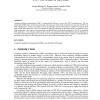Free Online Productivity Tools
i2Speak
i2Symbol
i2OCR
iTex2Img
iWeb2Print
iWeb2Shot
i2Type
iPdf2Split
iPdf2Merge
i2Bopomofo
i2Arabic
i2Style
i2Image
i2PDF
iLatex2Rtf
Sci2ools
115
click to vote
IADIS
2004
2004
Computer-Mediated Communication: Can we Make it Better?
Computer-mediated communication (CMC) is fundamentally different to face-to-face (FTF) communication. The low bandwidth of CMC filters out important social and contextual cues, which results in behaviour in users that is different to FTF communication. There are a number of social psychological theories that attempt to explain why reduced social cues in CMC affect behaviour. This work attempts to apply this knowledge to the design of the user interface (UI) of CMC applications. Key aspects of communication are identified and electronically represented in the UI of a prototype CMC application. Two evaluation studies are then carried out, using the Tropical Island Dilemma and the Map Task, to determine if the identified features have an effect on one-to-one distributed communication. Finally, a set of guidelines is presented for the design of CMC applications, which are derived from the findings of this work. KEYWORDS Computer-mediated communication (CMC), user interface (UI) design.
CMC Affect Behaviour | Cmc Applications | Computer-mediated Communication | IADIS 2004 | IADIS 2008 |
Related Content
| Added | 31 Oct 2010 |
| Updated | 31 Oct 2010 |
| Type | Conference |
| Year | 2004 |
| Where | IADIS |
| Authors | Sanjeet Bhachu, D. Ramanee Peiris, Annalu Waller |
Comments (0)

